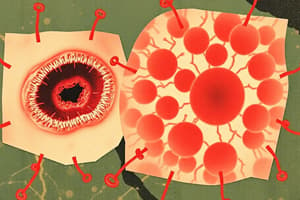Podcast
Questions and Answers
What is the defining characteristic of metaplasia?
What is the defining characteristic of metaplasia?
- It is irreversible
- It always leads to cancer
- It is caused by genetic mutations
- It involves conversion of one cell type to another (correct)
Which of the following statements about dysplasia is correct?
Which of the following statements about dysplasia is correct?
- It leads to tissues with uniform cell size and shape
- It may be a precursor of cancer (correct)
- It occurs in response to acute infection
- It is reversible
In the context of cellular injury, what happens in irreversible injury?
In the context of cellular injury, what happens in irreversible injury?
- Cells reach a point of no return and progress to cell death (correct)
- The injury is always reversible
- Cells return to normal when the injurious agent is removed
- Cell alterations regress and disappear
Which type of cellular injury involves exposure to temperature extremes like burn injuries?
Which type of cellular injury involves exposure to temperature extremes like burn injuries?
What characteristic distinguishes compensatory mechanism in the liver after surgical removal of a portion?
What characteristic distinguishes compensatory mechanism in the liver after surgical removal of a portion?
What is the main difference between atrophy and hypertrophy?
What is the main difference between atrophy and hypertrophy?
Which condition may lead to pathologic atrophy?
Which condition may lead to pathologic atrophy?
What distinguishes hyperplasia from hypertrophy?
What distinguishes hyperplasia from hypertrophy?
In which scenario might atrophy be considered a normal process?
In which scenario might atrophy be considered a normal process?
Why does hypertrophy not occur in nerve cells?
Why does hypertrophy not occur in nerve cells?
Flashcards are hidden until you start studying




